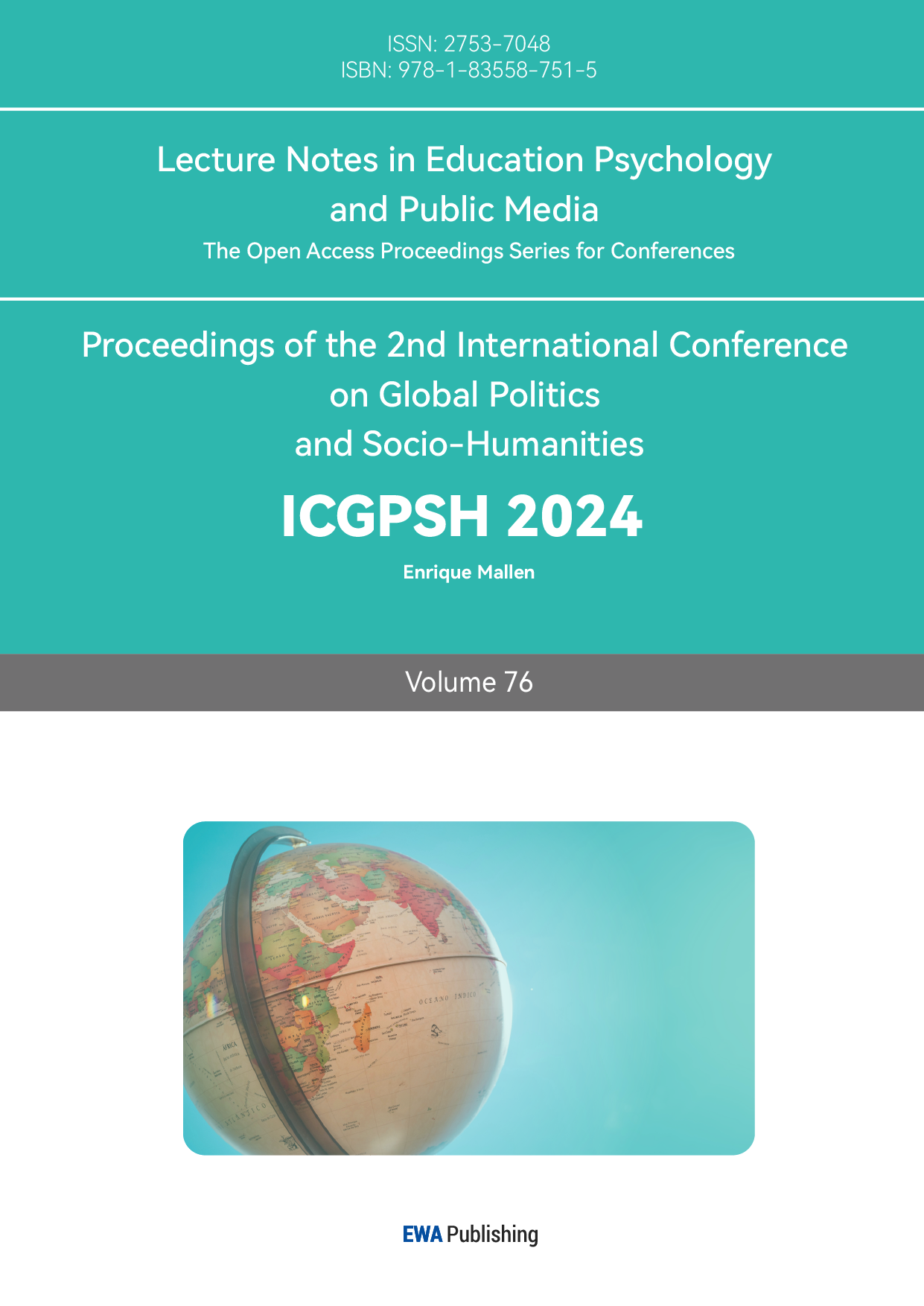1. Introduction
1.1. Background
Successful foreign language teaching is determined by many factors, among which students' learning style preferences are crucial in influencing the success of foreign language learning [1]. Achmad and Astiy’s article mentioned: "For college students, English language skills are necessary for completing academic studies, obtaining scholarships, grants, and better job opportunities [2]."
Previous studies often focused on comparative research on learning preferences such as auditory, visual, and kinesthetic, the correlation between learning preferences and English learning, and the impact of learning preferences in teaching. For example, Melani and Achmad's study showed that 49% of the 49 respondents preferred visual learning [3]. Achmad and Astiy’s research further confirmed the correlation between learning preferences and English proficiency, indicating that students tend to favor visual learning [2]. However, some studies explored the impact of auditory learning preferences on listening and reading comprehension, like Titing and Rogowsky’s research, which indicated no significant relationship between the two [4,5].
Despite existing studies on various aspects of language learning, there remains a notable gap in research specifically focused on Chinese native English-major students as the primary variable. Furthermore, the impact of auditory learning preferences on listening comprehension has yet to be comprehensively examined, highlighting an area ripe for further investigation.This study argues that Chinese college students are more inclined towards self-study, which increases the need for understanding learning preferences and could contribute to studying the positive effects of auditory learning preferences in listening comprehension.
1.2. Literature Review
Celce-Murcia defined learning styles as the habitual methods students use in learning a new language or subject, such as global or analytical approaches, auditory or visual learning methods [6]. In the field of educational psychology, there are also concepts related to learning styles. For example, Ormrod wrote, "Certain cognitive styles and personality traits do indeed influence how and what students learn [7]." These concepts and definitions reveal that learning style preferences, as learner variables, influence the choice of learning styles.
Sternberg, Grigorenko, and Zhang divided learning and thinking into two basic styles, ability and personality, and believed these are important for teaching and assessment [8]. Building on their theoretical frameworks, Pashler, McDaniel, Rohrer, and Bjork introduced the "meshing hypothesis," which posits a positive correlation between an individual's preferred learning style and their corresponding abilities. This hypothesis suggests that aligning instructional methods with learners' preferences may enhance educational outcomes [9]. However, Rogowsky's empirical research indicated that Pashler and colleagues found no empirical evidence to support a positive correlation between the two. Instead, they found a negative correlation in auditory learners, where the higher the preference for auditory learning, the lower the test scores [5]. However, Rrogowsky’s study focused on native English speakers rather than second language learners, which limited this conclusion.
Another study from Chitral University explored the reading performance of auditory and visual learners but found no difference between the two [10]. While the sample size was limited and comprised second-language learners whose native language was Urdu, this study contributes valuable insights into the understanding of learning style preferences.Goh’s research showed that factors like vocabulary, topic of the text, speech rate, and accent influence listening comprehension for two-thirds of learners [11]. This study will build on these factors to explore the positive effects of auditory learning preferences on listening comprehension and identify negative factors to provide guidance. The study will answer two questions:
What positive effects do auditory learning preferences have on listening comprehension for Chinese native English learners?
What common problems do learners encounter in English listening comprehension?
1.3. Research Overview
This paper is structured into four parts: the introduction outlines the research background, problems, and objectives; the literature review summarizes relevant theories and research findings, highlighting the influence of learning styles on listening comprehension; the research design and methodology section explains the data collection and analysis process; and the results and discussion section presents and analyzes the findings. The conclusion summarizes the research discoveries, offers future research directions, and provides teaching suggestions.
Through both quantitative and qualitative analyses, this research not only reveals the mechanisms of auditory learning preferences but also provides practical suggestions on balancing different learning styles in teaching, promoting students' holistic development.
The main contribution of this research lies in empirically verifying the positive effects of auditory learning preferences on listening comprehension, expanding the application of learning style theories. Additionally, the research proposes different teaching interventions to help students better adapt to English listening learning and enhance their learning efficiency. Finally, the study focuses on Chinese college students' English learning preferences, providing targeted empirical analysis as a reference for future English teaching design.
In conclusion, auditory learning preferences have clear advantages in enhancing college students' English listening comprehension abilities. However, current research on this preference is relatively limited, with most studies focusing on other learning styles. This study aims to fill that gap, deeply exploring the positive effects of auditory learning preferences on listening comprehension and proposing targeted teaching intervention strategies to provide theoretical support for English teaching practices.
1.4. Research Method
This research used a self-designed questionnaire to survey 120 English major college students through an online platform. All participants were informed of the purpose, content, and research methods before the survey began to ensure their rights were protected. The questionnaire was released on August 26, 2024, and was collected by September 2, 2024, for a period of 7 days.
The questionnaire encompassed several dimensions, including students' learning style preferences, their English listening habits, and preferences for listening materials. To quantify students' auditory learning style preferences, a Likert scale was employed, which has been validated for both reliability and validity. The collected data were analyzed using SPSS, descriptive statistics, correlation analysis, and variance analysis to explore the relationship between auditory learning preferences and English listening comprehension.
The entire research process lasted about two months, from questionnaire design, pre-survey, and formal survey to data analysis and report writing. The first week was the preparation stage, where a literature review was conducted to clarify the research questions, hypotheses, and objectives. The questionnaire was designed, including selecting and adapting the scales, and a pre-survey was conducted to test the reliability and validity of the questionnaire, with feedback incorporated into revisions. The second week involved data collection, where questionnaires were distributed online, and preliminary data sorting and filtering were conducted, excluding invalid responses. The third week was dedicated to data analysis using SPSS, including descriptive statistics, correlation, and variance analysis, to verify the research hypotheses and explore the impact of auditory learning preferences on listening comprehension. The fourth week involved interpreting and discussing the results, explaining the findings based on the data, and discussing their significance, possible reasons, and practical applications in teaching.
2. Data Analysis
This survey evaluated the benefits of listening to lectures, participating in group discussions, and reading aloud to improve learning, identifying issues, and proposing corresponding measures for improvement. A total of 120 online questionnaires were distributed, and 110 valid questionnaires were returned, with a recovery rate of 91.67%. The analysis is as follows:
2.1. Basic Information
Table 1: Information
|
Option |
Participant |
Proportion |
Do you prefer to learn in lecture and group discussion, or in picture and videos? |
Auditory Learning Style |
45 |
40.91% |
|
Visual Learning Style |
65 |
59.09% |
Have you ever taken an IELTS test |
Yes |
110 |
100% |
|
No |
0 |
0% |
Your Score |
4.5-5 |
9 |
8.18% |
|
5.5-6 |
18 |
16.36% |
|
6.5-7 |
39 |
35.45% |
|
7.5-8 |
27 |
24.55% |
|
8.5-9 |
17 |
15.45% |
Table 1 shows that 40.91% of the students prefer auditory learning (lectures, group discussions, etc.), while 59.09% prefer visual learning. All respondents had taken the IELTS exam, with scores ranging from 4.5 to 9 points, and most students scored between 6.5 and 7 points (35.45%). This reflects the differences in students’ listening skills.
2.2. Reliability and Validity Testing
The reliability (Cronbach's Alpha) of the questionnaire was 0.901, and the validity (KMO value) was 0.931, indicating that the questionnaire has high reliability and validity, and the data analysis results are credible.
2.3. Statistical Analysis
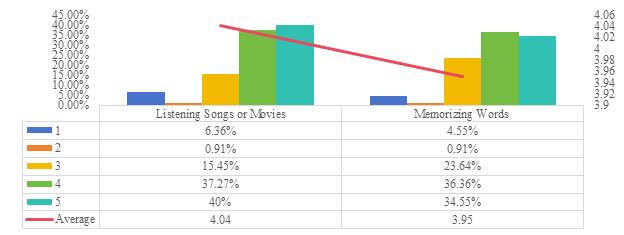
Figure 1: I prefer listening to English songs or movies to improve my listening skills rather than memorizing words
In Figure 1, regarding the question "I prefer improving my listening skills by listening to English songs or watching film clips rather than memorizing words," 40% of students "strongly preferred" songs or film clips to enhance their listening skills, with an average score of 4.04. In contrast, the traditional method of memorizing words was slightly less favored, with an average score of 3.95. This data reveals that in the process of learning English, learners tend to adopt more engaging and enjoyable methods, such as listening to English songs or watching film clips, to enhance their language abilities and interest. While memorizing words, as a traditional learning method, still retains some appeal, its popularity may be affected by its relatively monotonous nature.
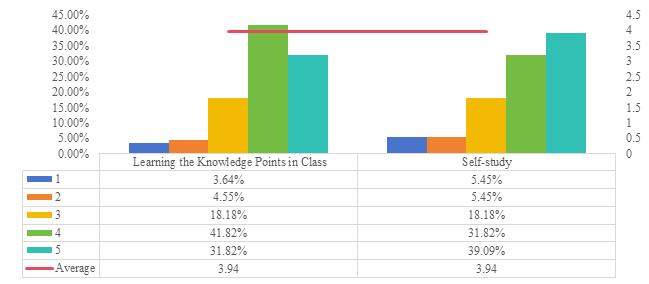
Figure 2: I prefer learning the knowledge points in class rather than self-study.
In Figure 2, regarding "the knowledge points learned in class," both classroom learning and self-study reading received an average score of 3.94. However, the feedback from students on classroom learning was more consistent, indicating that classroom teaching offers greater consistency in knowledge delivery. When choosing learning methods, learners value both the directness and structure of classroom knowledge acquisition while also appreciating the flexibility and autonomy provided by self-study reading. The equal average scores for both methods may reflect learners’ efforts to seek balance and diversity in their learning paths within a varied learning environment.
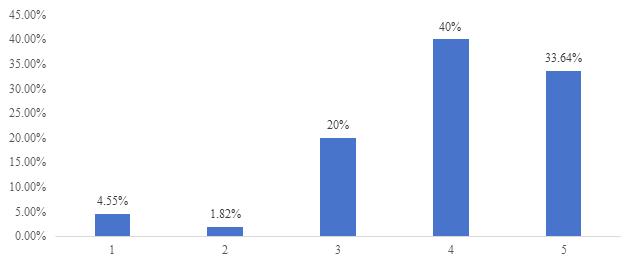
Figure 3: I can acquire the knowledge by participating in group discussions.
Figure 3 shows that 73.64% of students believe that group discussions help them better acquire knowledge, with an average score of 3.96, reflecting the high recognition of this learning method. It is evident that participating in group discussions to gain knowledge has become a widely accepted learning method among most college students. This not only facilitates the multidirectional flow of information but also helps learners understand issues from multiple perspectives. Additionally, the interactive exchange sparks new ideas, thereby improving the overall effectiveness and quality of learning.
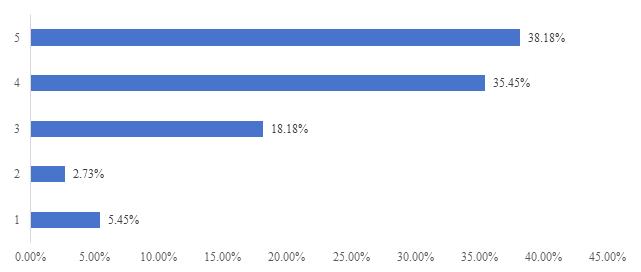
Figure 4: I can gain knowledge by reading aloud.
Figure 4 indicates that the proportion of respondents who selected "strongly disagree" or "somewhat disagree" was low, accounting for only 8.18%, showing that only a small number of students rarely or never use reading aloud as a learning method. Notably, a significant 38.18% of respondents firmly chose "strongly agree," an overwhelming majority that highlights the enduring appeal and effectiveness of reading aloud in modern educational environments. It also reflects that, through practice, many students deeply recognize the unique value of reading aloud in enhancing knowledge absorption, emotional resonance, and reading skills.
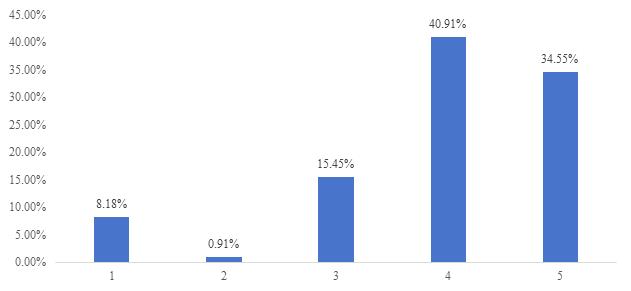
Figure 5: I understand better in class when I participate in role-play
In Figure 5, 40.91% of students indicated that role-playing enhanced their understanding of classroom content, with an average score of 3.93. Although individual differences were somewhat large, this view was still widely recognized. Notably, 34.55% of surveyed students chose "strongly agree," a proportion close to those who "somewhat agree," forming the dominant force in the data. This overwhelming majority not only reflects the significant effectiveness of role-playing in improving classroom comprehension but also highlights the respondents' high recognition and positive evaluation of this teaching method. Data analysis shows that among the respondents, participating in role-playing is widely viewed as an effective learning strategy that helps students better understand and grasp knowledge in the classroom. Despite a few dissenting voices, overall, the vast majority have affirmed and praised the positive effects of role-playing.
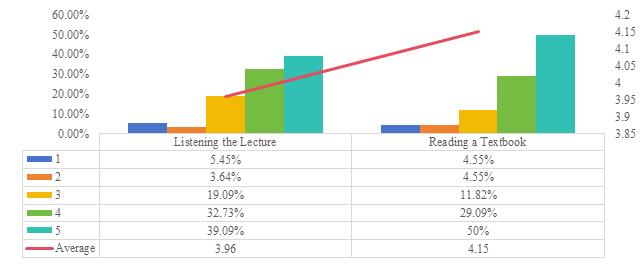
Figure 6: I’d rather listen to the lecture than read a textbook.
Figure 6 shows that students prefer lectures, with 39.09% indicating "strongly agree." However, the average score for textbook learning is slightly higher at 4.15, indicating a balance between the two. The data suggests that listening to lectures has garnered higher overall recognition within the respondent group due to its unique appeal and advantages. These findings not only reveal the diversity in respondents' choices of learning methods but also highlight the critical position of listening to lectures as an effective and popular learning tool in the modern educational environment.
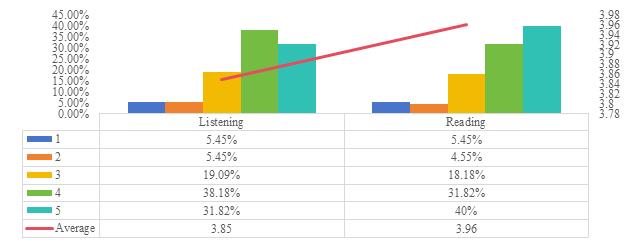
Figure 7: When I learn a new skill, I prefer to listen to others’ viewpoints rather than reading the teacher's blackboard.
Figure 7 indicates that students slightly prefer listening to others explain when learning new skills, with an average score of 3.85. Although the average score for board writing is 3.96, the difference between the two is minimal, suggesting that the effectiveness of both methods is quite similar. Importantly, in the higher-scoring segments, "listening" clearly holds an advantage, indicating its popularity among respondents. The data shows that students are more inclined to listen to others' narratives and experiences when learning new skills. They may believe this approach provides a richer and more concrete learning experience, helping them grasp skills more quickly and reduce trial-and-error costs. Therefore, for educators and learners, listening as an important learning tool should receive more attention and application.
3. Discussion
The results of this survey indicate that auditory learning styles are prevalent among college students. The survey data shows that, despite the more common visual learning style, over 40% of students prefer auditory learning through lectures, interviews, or group discussions, highlighting the universality and significance of auditory learning styles.
Secondly, there is diversity in English listening comprehension, with significant differences in students' listening levels ranging from 4.5–5 to 8.5–9. This reflects the varying abilities and needs of different students in terms of listening comprehension. Additionally, the study found that students had varying levels of acceptance regarding listening to English songs or watching film clips. The majority of students express a preference for enhancing their listening skills through English songs and films, a method that significantly surpasses traditional vocabulary memorization in popularity. This preference suggests that auditory learning approaches resonate more effectively with students' interests and learning needs.
Moreover, classroom learning and self-directed reading are complementary. The knowledge points heard in class and self-study reading received recognition from students for enhancing their understanding. However, evaluating classroom learning's effectiveness is more consistent, suggesting an advantage in knowledge transmission and comprehension. Therefore, teachers should fully use classroom time to design more interactive elements, such as questions, discussions, and case analyses, to enhance students' ability to absorb and apply knowledge.
Finally, group discussions and role-playing have a positive effect. Students generally believe that interactive learning methods, such as group discussions and role-playing, help them acquire and understand knowledge better, demonstrating the effectiveness of these approaches in promoting knowledge exchange and stimulating thinking. Thus, teachers should incorporate more interactive learning modes like group discussions and role-playing into their teaching, making them an important part of the curriculum. This not only enhances students' interest and participation in learning but also cultivates their teamwork and problem-solving skills.
3.1. Variation Analysis
Table 2: Preferred method for auditory learning (mean ± standard deviation)
|
Auditory Learning Style(n=45) |
Visual Learning Style(n=65) |
|
|
Listening Score |
3.44±1.22 |
3.08±1.08 |
1.666 |
0.099 |
Listening Songs or Watching Movies |
4.04±1.15 |
4.03±1.05 |
0.065 |
0.948 |
Reciting Words |
4.13±0.81 |
3.83±1.13 |
1.544 |
0.126 |
Acquiring the Knowledge Points in Class |
3.87±1.08 |
3.98±0.96 |
-0.602 |
0.548 |
Self-reading |
3.87±1.14 |
3.98±1.14 |
-0.534 |
0.595 |
* p<0.05 ** p<0.01 |
||||
From the table above, it can be observed that there are no significant differences (p > 0.05) in the preferred methods for auditory learning concerning listening scores, listening to English songs or film clips, vocabulary memorization, knowledge points heard in class, and self-directed reading. This indicates that students exhibit consistency across these different auditory learning preferences without notable disparities.
Teachers should encourage students to explore various learning methods to find the one that suits them best. This approach not only enhances students' interest in learning but also helps cultivate their overall language proficiency. Furthermore, teachers should pay attention to the individual differences of each student, understanding their learning needs, interests, and difficulties to provide personalized guidance and support. Educators can help students realize their potential and improve their listening scores by adopting a tailored teaching approach.
4. Conclusion
This study explores the impact of auditory learning preferences on college students' English listening comprehension abilities. It finds that auditory learners excel in processing complex listening materials and recognizing nuances in speech and intonation. These results confirm the positive effects of auditory learning preferences and indicate that applying personalized learning styles can effectively enhance students' comprehension and learning performance in English listening.
Unlike previous research that often focuses on visual learning preferences, this study emphasizes the advantages of auditory learning styles, filling a research gap regarding the specific role of auditory learning preferences in English listening comprehension within the context of higher education.
The study reveals the significance of auditory learning preferences in improving English listening comprehension and provides guiding recommendations for future teaching practices. Teachers should consciously incorporate various learning styles into their instructional designs to promote holistic student development, enhancing their interest and efficiency in learning. Through this diversified teaching strategy, students' individualized needs can be better met, and the overall effectiveness of language instruction can also be improved. The results of this study hold important reference value for English education practices, aiding in the optimization of teaching strategies, enhancing student learning experiences, and improving their language skills.
However, it is important to note that despite achieving beneficial results in exploring the positive effects of auditory learning preferences on listening comprehension abilities, this study has certain limitations. Firstly, the research sample is limited to a group of college students whose native language is Chinese, with a relatively small sample size concentrated on a specific level of English proficiency. This limits the generalizability of the findings, particularly in multilingual and multicultural contexts. Secondly, the study did not sufficiently consider other external variables influencing listening comprehension, such as contextual backgrounds, learning environments, and teaching modes. Therefore, future research could expand the sample size to include learners from different native languages and cultural backgrounds to further validate and promote the applicability of the findings.
Future studies should also explore how to effectively integrate multiple learning styles in actual classrooms, especially how to design teaching activities that accommodate auditory, visual, kinesthetic, and other learning preferences. By merging these styles, the strengths of each learning preference can be maximized while reducing students' reliance on a single mode of learning. Additionally, future research should focus on how to design personalized instructional interventions that address individual differences, helping students with a preference for auditory learning to overcome potential learning challenges.
Authors Contribution
All the authors contributed equally and their names were listed in alphabetical order.
References
[1]. Brown, N. R., Terry Jr, R., & Kelsey, K. D. (2013). The impact of learning styles on learning outcomes at FFA camp: What campers retain over time. Journal of Agricultural Education, 54(4), 206-220.
[2]. Wahyudin, A. Y., & Wahyuni, A. (2022). Exploring Students’ Learning Style and Proficiency at a University in Indonesia: A Quantitative Classroom Research. TEKNOSASTIK, 20(2), 77-85.
[3]. Ariastuti, M. D., & Wahyudin, A. Y. (2022). Exploring academic performance and learning style of undergraduate students in English Education program. Journal of English Language Teaching and Learning, 3(1), 67-73.
[4]. Magfirah, T. (2018). STUDENTS’ READING AND LISTENING COMPREHENSION BASED ON THEIR LEARNING STYLES. International Journal of Education, 10(2), 107-113.
[5]. Rogowsky, B. A., Calhoun, B. M., & Tallal, P. (2020). Providing instruction based on students’ learning style preferences does not improve learning. Frontiers in Psychology, 11, 511773.
[6]. Celce-Marcia, M. (2001). Teaching English as a Second or Foreign Language,(3rd) NY: Dewey.
[7]. Ormrod, J.E. (2008). Educational psychology: Developing learners(6th ed.).Upper Saddle River, NJ: Pearson.
[8]. Sternberg, R. J., Grigorenko, E. L., & Zhang, L. F. (2008). Styles of learning and thinking matter in instruction and assessment. Perspectives on psychological science, 3(6), 486-506.
[9]. Pashler, H., McDaniel, M., Rohrer, D., & Bjork, R. (2008). Learning styles: Concepts and evidence. Psychological science in the public interest, 9(3), 105-119.
[10]. Siddiqui, K. A., Abbasi, R. H., Khan, I., & Memon, A. R. (2023). Examining Visual and Auditory Learners’ Reading and Listening Comprehension Skills: A Causal Comparative StudyStudy. University of Chitral Journal of Linguistics and Literature, 7(II), 121-127.
[11]. Goh, C. (1999). How much do learners know about the factors that influence their listening comprehension?. Hong Kong Journal of Applied Linguistics, 4(1), 17-42.
Cite this article
Liu,J.;Sun,Y.;Yan,B.;Zhu,X. (2024). Analysis of the Positive Influence of Auditory Learning Style Preference on College Students’ English Listening Comprehension. Lecture Notes in Education Psychology and Public Media,76,32-42.
Data availability
The datasets used and/or analyzed during the current study will be available from the authors upon reasonable request.
Disclaimer/Publisher's Note
The statements, opinions and data contained in all publications are solely those of the individual author(s) and contributor(s) and not of EWA Publishing and/or the editor(s). EWA Publishing and/or the editor(s) disclaim responsibility for any injury to people or property resulting from any ideas, methods, instructions or products referred to in the content.
About volume
Volume title: Proceedings of the 2nd International Conference on Global Politics and Socio-Humanities
© 2024 by the author(s). Licensee EWA Publishing, Oxford, UK. This article is an open access article distributed under the terms and
conditions of the Creative Commons Attribution (CC BY) license. Authors who
publish this series agree to the following terms:
1. Authors retain copyright and grant the series right of first publication with the work simultaneously licensed under a Creative Commons
Attribution License that allows others to share the work with an acknowledgment of the work's authorship and initial publication in this
series.
2. Authors are able to enter into separate, additional contractual arrangements for the non-exclusive distribution of the series's published
version of the work (e.g., post it to an institutional repository or publish it in a book), with an acknowledgment of its initial
publication in this series.
3. Authors are permitted and encouraged to post their work online (e.g., in institutional repositories or on their website) prior to and
during the submission process, as it can lead to productive exchanges, as well as earlier and greater citation of published work (See
Open access policy for details).
References
[1]. Brown, N. R., Terry Jr, R., & Kelsey, K. D. (2013). The impact of learning styles on learning outcomes at FFA camp: What campers retain over time. Journal of Agricultural Education, 54(4), 206-220.
[2]. Wahyudin, A. Y., & Wahyuni, A. (2022). Exploring Students’ Learning Style and Proficiency at a University in Indonesia: A Quantitative Classroom Research. TEKNOSASTIK, 20(2), 77-85.
[3]. Ariastuti, M. D., & Wahyudin, A. Y. (2022). Exploring academic performance and learning style of undergraduate students in English Education program. Journal of English Language Teaching and Learning, 3(1), 67-73.
[4]. Magfirah, T. (2018). STUDENTS’ READING AND LISTENING COMPREHENSION BASED ON THEIR LEARNING STYLES. International Journal of Education, 10(2), 107-113.
[5]. Rogowsky, B. A., Calhoun, B. M., & Tallal, P. (2020). Providing instruction based on students’ learning style preferences does not improve learning. Frontiers in Psychology, 11, 511773.
[6]. Celce-Marcia, M. (2001). Teaching English as a Second or Foreign Language,(3rd) NY: Dewey.
[7]. Ormrod, J.E. (2008). Educational psychology: Developing learners(6th ed.).Upper Saddle River, NJ: Pearson.
[8]. Sternberg, R. J., Grigorenko, E. L., & Zhang, L. F. (2008). Styles of learning and thinking matter in instruction and assessment. Perspectives on psychological science, 3(6), 486-506.
[9]. Pashler, H., McDaniel, M., Rohrer, D., & Bjork, R. (2008). Learning styles: Concepts and evidence. Psychological science in the public interest, 9(3), 105-119.
[10]. Siddiqui, K. A., Abbasi, R. H., Khan, I., & Memon, A. R. (2023). Examining Visual and Auditory Learners’ Reading and Listening Comprehension Skills: A Causal Comparative StudyStudy. University of Chitral Journal of Linguistics and Literature, 7(II), 121-127.
[11]. Goh, C. (1999). How much do learners know about the factors that influence their listening comprehension?. Hong Kong Journal of Applied Linguistics, 4(1), 17-42.





